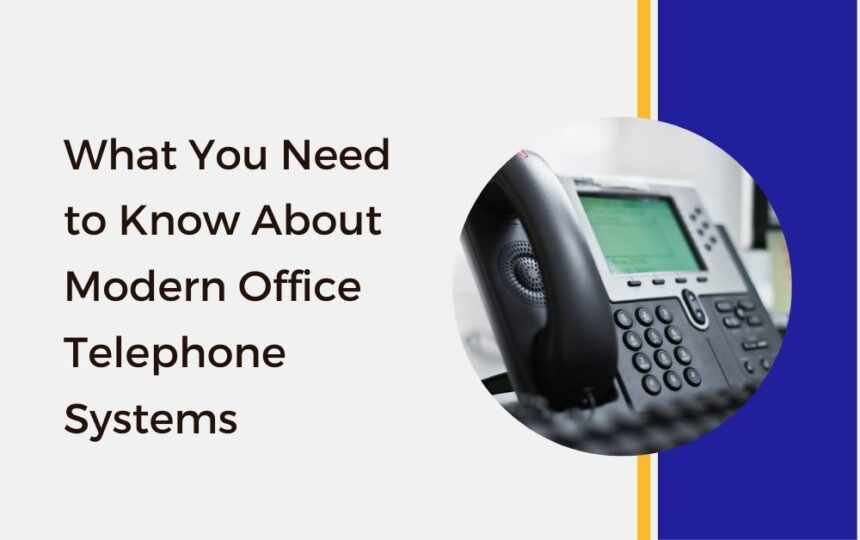In today’s world, communication is the backbone of any business. Whether you’re a small business or a large organization, staying connected with your team and customers is vital. Office telephone systems are an essential tool for this purpose. But with so many options available today, it’s easy to get overwhelmed by the choices. This blog will guide you through what you need to know about modern office telephone systems, helping you make informed decisions for your business.
Understanding What an Office Telephone System Is
At its core, an office telephone system allows communication between employees within a company and with external customers or partners. It might seem simple, but with modern technology, these systems have evolved into much more than just making calls. Traditional phone systems, often using landlines, are still used by some businesses. However, today’s telephone systems, like VoIP (Voice over Internet Protocol), offer more advanced features, making communication easier and more efficient.
Unlike the older systems, which required physical phone lines, modern systems can use the internet to handle calls. This makes them more flexible, allowing businesses to communicate from almost anywhere. Additionally, features like call forwarding, conference calling, voicemail, and more have made modern office telephone systems an integral part of running a smooth business operation.
Note – Enhance your business communication with advanced Office Telephone Systems from Soyuz Tec Trading LLC. Discover the perfect solution for seamless connectivity, improved productivity, and cost-effective communication. Contact Soyuz Tec Trading LLC today to find the ideal telephone system tailored to your business needs!
Different Types of Office Telephone Systems
There are several types of office telephone systems available, each with its own benefits and drawbacks. Knowing the differences can help you choose the right one for your business.
- Traditional Landline Systems: These are the basic systems that have been used for decades. They rely on physical phone lines installed by your local telephone company. They are generally reliable, but they lack the advanced features offered by newer systems. These systems are becoming less common, as most businesses are moving toward more flexible and feature-rich options.
- VoIP Systems: VoIP systems allow calls to be made over the internet. This means that as long as you have a stable internet connection, you can make and receive calls. VoIP systems are highly flexible and can be used on a wide range of devices, from desk phones to smartphones and computers. This type of system also often includes features such as video conferencing, instant messaging, and file sharing.
- Cloud-Based Systems: Cloud-based phone systems are a form of VoIP, but they are hosted in the cloud, meaning you don’t need to maintain the hardware on-site. The provider manages the system remotely, which can save on setup and maintenance costs. Cloud systems are particularly useful for businesses with remote workers, as employees can access the system from anywhere.
- PBX Systems: Private Branch Exchange (PBX) systems are a bit more complex. They manage internal and external calls and can offer a range of features like call routing, voicemail, and automated attendants. Some PBX systems are hosted on-site, while others are hosted in the cloud. The choice between these depends on the size and needs of your business.

Benefits of Modern Office Telephone Systems
Modern office telephone systems bring a range of benefits to businesses. These systems are designed to improve communication, reduce costs, and increase flexibility. Below are some key benefits that make them essential for today’s businesses.
Cost Efficiency: Traditional landline systems can be expensive, especially when long-distance or international calls are involved. VoIP and cloud-based systems, however, often come with much lower costs, particularly when it comes to international communication. Since these systems use the internet to transmit calls, they can reduce or eliminate many of the charges associated with traditional phone systems.
Flexibility: One of the most important advantages of modern telephone systems is their flexibility. With VoIP and cloud-based systems, employees can make and receive calls from anywhere, as long as they have an internet connection. This is a huge benefit for businesses that have employees working from home or in different locations around the world.
Scalability: Another major benefit is scalability. As your business grows, your telephone system can grow with you. Traditional systems often require significant upgrades when you add more employees, but modern systems allow you to easily add new lines and features without large investments in hardware.
Advanced Features: Modern systems come packed with features that can help streamline your business operations. These include call forwarding, voicemail to email, video conferencing, and call analytics, to name a few. These features improve both internal and external communication, making your business more efficient.
Factors to Consider When Choosing a Telephone System
Choosing the right office telephone system for your business is a critical decision. There are several factors you should consider to ensure you make the right choice.
Business Size and Growth Plans: The size of your business and its growth plans play a significant role in choosing the right system. If you’re a small business, you might not need all the advanced features of a large PBX system. However, if you plan to grow, choosing a scalable system like VoIP or cloud-based systems will allow you to expand without needing to replace your entire system.
Budget: Your budget will also impact your decision. While traditional landlines may seem cheaper initially, the long-term costs associated with maintenance, hardware upgrades, and international calling charges can add up. VoIP and cloud systems often offer better value for money, especially for businesses that make a lot of long-distance or international calls.
Features: Think about the features your business needs. Do you require call recording, video conferencing, or the ability to handle a large volume of calls? Some systems come with a wide range of features, while others are more basic. Make sure the system you choose meets your business’s specific communication needs.
Ease of Use: Some systems are more complex to set up and use than others. VoIP and cloud-based systems are generally easier to manage, as they often come with user-friendly interfaces and don’t require much hardware. On the other hand, traditional and on-site PBX systems may need more technical support and maintenance.
The Future of Office Telephone Systems
The future of office telephone systems is closely tied to advances in technology. As more businesses shift to remote work and global teams, the demand for flexible, internet-based communication systems will continue to rise.
Integration with Other Tools: Modern office telephone systems are likely to become even more integrated with other business tools. For instance, integrating your phone system with customer relationship management (CRM) software can help your team better track customer interactions and improve service.
Artificial Intelligence (AI): AI will also play a bigger role in the future of office communication. AI-powered phone systems can handle tasks such as automated call routing, transcribing voicemail, and even offering customer support through virtual assistants. These features can save time and improve the efficiency of your team.
Enhanced Security: As communication moves more into the digital space, security will become increasingly important. Modern office telephone systems are likely to see enhanced security measures to protect against hacking and data breaches. Encryption, secure logins, and other security features will ensure that business communications remain safe.
Conclusion: Why You Need to Invest in a Modern Office Telephone System
Investing in a modern office telephone system is more important now than ever before. As businesses continue to rely on flexible, reliable communication tools, having the right system in place can help improve productivity, reduce costs, and scale with your business’s growth. Whether you choose a traditional system, VoIP, or a cloud-based solution, understanding the options available will help you make the best decision for your business.
By choosing the right office telephone system, you’re not just investing in better communication—you’re investing in the future success of your business. Make sure you assess your company’s needs, budget, and plans for the future before making a final decision, and you’ll be well on your way to staying connected in a fast-paced business world.
For more insightful articles related to this topic, feel free to visit newsdusk.com



